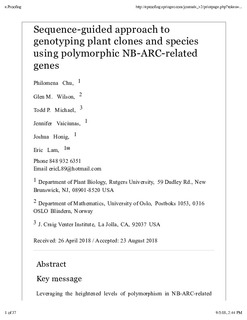Sequence-guided approach to genotyping plant clones and species using polymorphic NB-ARC-related genes
Wilson, Glen Matthew; Chu, Philomena; Michael, Todd P.; Vaiciunas, Jennifer; Honig, Joshua; Lam, Eric
Journal article, Peer reviewed
Accepted version
Permanent lenke
http://hdl.handle.net/11250/2584854Utgivelsesdato
2018Metadata
Vis full innførselSamlinger
- Institutt for matematiske fag [2446]
- Publikasjoner fra CRIStin - NTNU [38062]
Sammendrag
Rapid and economical genotyping tools that can reliably distinguish species and intraspecific variations in plants can be powerful tools for biogeographical and ecological studies. Clones of the cosmopolitan duckweed species, Spirodela polyrhiza, are difficult to distinguish morphologically due to their highly abbreviated architecture and inherently low levels of sequence variation. The use of plastidic markers and generic Amplification Fragment Length Polymorphism approaches have met with limited success in resolving clones of S. polyrhiza from diverse geographical locales. Using whole genome sequencing data from nine S. polyrhiza clones as a training set, we created an informatic pipeline to identify and rank polymorphic regions from nuclear-encoded NB-ARC-related genes to design markers for PCR, Sanger sequencing (barcoding), and fragment length analysis. With seven primer sets, we found 21 unique fingerprints from a set of 23 S. polyrhiza clones. However, three of these clones share the same fingerprint and are indistinguishable by these markers. These primer sets can also be used as interspecific barcoding tools to rapidly resolve S. polyrhiza from the closely related S. intermedia species without the need for DNA sequencing. Our work demonstrates a general approach of using hyper-polymorphic loci within genomes as a resource to produce facile tools that can have high resolving power for genotyping applications.
